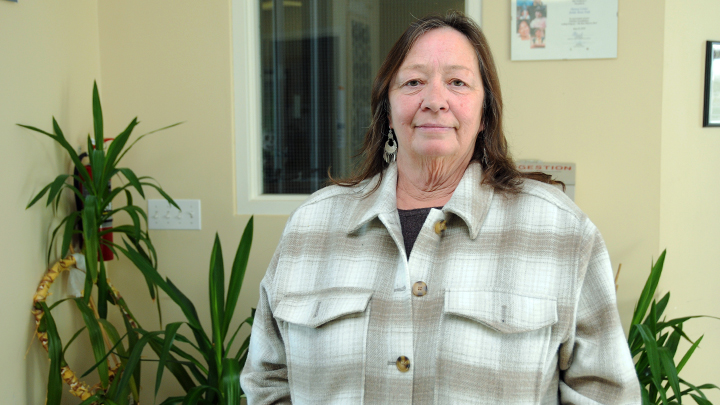
November 21, 2023

For Ann Stuart, a routine prescription refill turned into an unexpected journey navigating her lung-cancer diagnosis. One in 13 Albertans will develop lung cancer in their lifetime, and more than 1,500 will die each year as a result. However, for high-risk Albertans with no symptoms, getting screened regularly can lower the risk of dying from lung cancer by almost 25 per cent. Stuart encourages others who might be eligible for screening to talk to their family physicians and learn more. “I just think people should not be afraid. I was surrounded by people who were so encouraging and kind. There’s nothing to lose and everything to gain if you go early enough, which, I am so lucky I did.” Photo by Paul Rotzinger.
Story by Vanessa Gomez | Photo by Paul Rotzinger
CALGARY — During a routine appointment to refill a prescription, Ann Stuart was hardly expecting to have a conversation about lung cancer screening with her primary care physician.
“My doctor brought it up with me and said I was of age to participate in this new lung cancer screening program. I just thought ‘You know what, I’m almost 60 years old, I may as well and I’m a smoker and everything’.”
Stuart’s physician quickly set up her referral to the Alberta Lung Cancer Screening Program (ALCSP), which provides lung cancer screening using low-dose computed tomography (CT) scans to eligible Albertans, aged 50 to 74 who smoke cigarettes, or who’ve quit after smoking for many years.
“I went for the examination in April of 2023 and then went for the CT scan to see if there was anything in there — and they saw something,” says Stuart. “After the biopsy, they discovered it was stage 1 lung cancer.”
One in 13 Albertans will develop lung cancer in their lifetime, and more than 1,500 will die each year as a result. However, for high-risk Albertans with no symptoms, getting screened regularly can lower the risk of dying from lung cancer by almost 25 per cent.
“Being able to detect lung cancer early and before it has spread to other parts of the body is important in providing the best possible outcomes for patients,” says Nadine Strilchuk, Nurse Practitioner, ALCSP.
“Screening with low-dose CT scans can detect lung cancer earlier, before someone has symptoms, and when treatment is more likely to be effective.”
Albertans can be referred to the program by their primary care provider — or by contacting the ALCSP directly. The program’s partnerships with Primary Care Networks (PCNs) across the province is integral to ensuring Albertans have access to this vital service.
“The partnership between AHS and PCNs has better enabled primary care providers to support screening of patients who are at a higher risk for lung cancer,” says Jacqueline VanMalsen, Senior Manager, Mosaic PCN.
“Health screening can help detect problems early and also supports patients to take action on modifiable risk factors. For example, tobacco-cessation supports are available to all people referred to the Alberta Lung Cancer Screening Program.”
Dr. Brenden Kunimoto, Stuart’s physician, adds: “As a primary care physician, being able to refer patients directly for screening allows us to closely follow their journey and work with other providers to set them up for the best possible treatment plan. We play an important role in identifying patients who need screening and referring them to the supports they may need before, during and after treatment.”
Stuart’s surgery was scheduled for June 2023 and she took steps to ensure she was as healthy as possible — including quitting smoking with the help of the Alberta Quits Program.
“The healing process is so much quicker since we were able to catch it early,” says Stuart. “I lost 20 per cent of my lung, which affects my breathing, but I was able to get up and walk around fairly quickly, and back to work three weeks after my operation.”
Stuart encourages others who might be eligible for screening to talk to their family physicians and learn more.
“I just think people should not be afraid. I was surrounded by people who were so encouraging and kind. There’s nothing to lose — and everything to gain — if you go early enough. I am so lucky I did.”